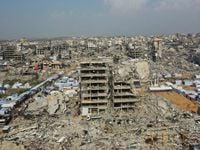In a significant escalation of hostilities, two Israeli soldiers were killed and four others wounded in combat in the southern Gaza Strip, as confirmed by the Israeli army on Friday, May 9, 2025. This latest incident follows a series of fierce confrontations between Israeli forces and Hamas militants in the region, particularly around Rafah, where clashes have intensified in recent days.
According to a statement from Hamas, its militants engaged in what they described as "fierce fighting" with Israeli soldiers on Thursday, May 8, 2025. The militant group reported that its fighters ambushed a 12-man Israeli unit in the Tanur neighborhood of eastern Rafah using two anti-personnel and anti-armor rockets, resulting in casualties among the Israeli troops. This marks a notable shift, as most recent clashes had been concentrated in the eastern areas of Khan Younis and northern Gaza.
The ongoing conflict has seen a marked increase in violence since Israel resumed its offensive in March 2025, following the collapse of a fragile, US-backed ceasefire that had briefly halted hostilities. Earlier this month, Prime Minister Benjamin Netanyahu announced plans for a new, intensified military operation aimed at "conquering" the Gaza Strip and establishing a sustained Israeli presence there. This announcement has drawn sharp criticism both domestically and internationally.
In a video posted on social media platform X, Netanyahu detailed that the Israeli security cabinet had approved a plan for a military strategy that includes the potential displacement of Gaza's population. Finance Minister Bezalel Smotrich articulated the extreme end of this strategy, suggesting that an Israeli victory would lead to the complete destruction of Gaza and the concentration of its residents in the south, from where they would be expected to emigrate to third countries.
Hamas has condemned this plan as an "explicit decision to sacrifice" Israeli hostages, arguing that it significantly escalates the conflict beyond previous military objectives. Political analysts have noted that Netanyahu's ultimate goal appears to be the voluntary emigration of Gaza's population, a stance that has evolved since the onset of the military response to Hamas's cross-border attacks in early 2024.
In January 2024, Netanyahu had claimed that Israel had "no intention of permanently occupying Gaza or displacing its civilian population." However, by September 2024, the Israeli government was reportedly considering a more permanent occupation, particularly in the northern regions of Gaza, amidst the backdrop of a humanitarian crisis that has seen approximately 35,000 Gazans killed and nearly 1.9 million displaced.
As the situation continues to deteriorate, humanitarian aid has been severely restricted, with Israel cutting off supplies and intensifying airstrikes. The United Nations has described conditions in northern Gaza as "apocalyptic," with residents facing famine and extreme deprivation.
In response to increasing calls for intervention, Egypt’s President Abdel Fattah El-Sisi reiterated his country’s refusal to accept displaced Palestinians, emphasizing that the deportation and displacement of the Palestinian people is an injustice that Egypt cannot endorse. This sentiment has been echoed by other regional leaders, including those from Qatar, who have committed to mediating for de-escalation and relief efforts.
Meanwhile, the Israeli military has been employing modified commercial drones, specifically those manufactured by the Chinese company DJI, to conduct surveillance and carry out attacks in Gaza. An investigation by Al Jazeera’s Sanad verification agency revealed that these drones have been used to target hospitals and civilian shelters, as well as to surveil Palestinian prisoners being used as human shields in violation of international law.
DJI has faced criticism for its continued sales to Israel, despite having previously suspended sales to both Ukraine and Russia amid the ongoing conflict there. The company's drones have been repurposed for military use in ways that raise serious ethical concerns about their deployment in civilian areas. Al Jazeera's findings indicate that the Israeli military's use of these drones has escalated, with reports of direct attacks on civilian infrastructure.
In one documented incident, a DJI Agras drone reportedly dropped a bomb on a building housing a Turkish charity in Jabalia, northern Gaza, located dangerously close to a school serving as a shelter. Furthermore, footage from an Israeli drone captured a Palestinian being used as a human shield in Shujaiya, underscoring the troubling tactics employed in urban warfare.
As the conflict continues, the international community watches closely, with many nations expressing concern over the humanitarian implications of Israel's military actions and the potential for further displacement of Palestinians. The situation remains fluid, with ongoing military operations and diplomatic efforts to address the crisis.
The Israeli government’s current trajectory raises pressing questions about the future of Gaza and the broader implications for regional stability. As Netanyahu's administration pushes forward with its military objectives, the humanitarian crisis in Gaza deepens, prompting urgent calls for intervention and relief.
In conclusion, the conflict in Gaza illustrates the complex interplay of military strategy, political ambition, and humanitarian need, leaving many to wonder what the future holds for the region and its people.




